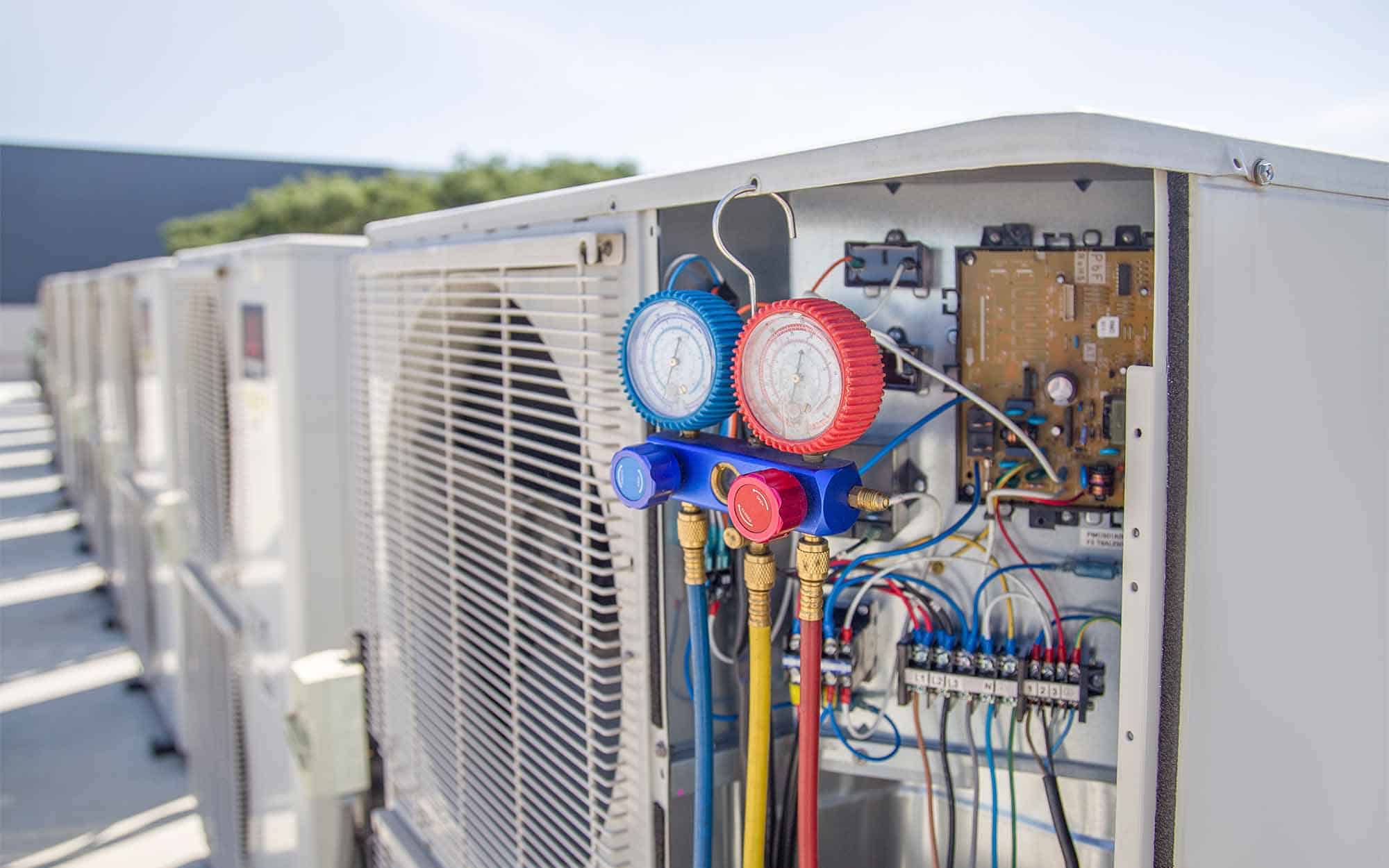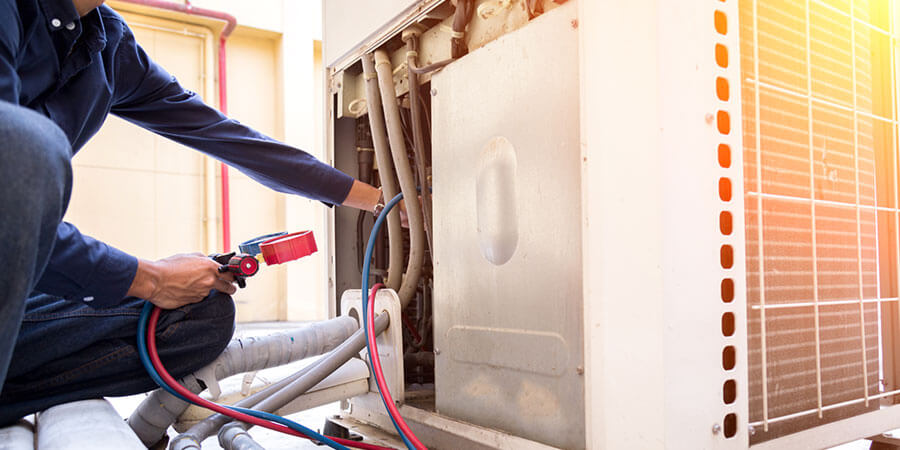heat pump service: What It Includes and Why It Matters
heat pump service: What It Includes and Why It Matters
Blog Article
Choosing In Between a Warm Pump and Furnace: Secret Considerations for Your HVAC Requirements
When assessing home heating choices for HVAC requires, the choice in between a heat pump and a furnace can be intricate. Each system supplies unique advantages customized to details climates and power performance goals. Comprehending these differences is vital for making an informed choice. Key variables such as setup prices and ecological impact better complicate the option process. Which choice genuinely aligns with one's comfort and sustainability preferences? The following sections will check out these considerations thoroughly.
Comprehending Warmth Pumps: How They Function and Their Benefits
While several homeowners think about various heating options, recognizing exactly how heatpump feature and their advantages can greatly affect their choice. Heatpump operate by transferring warmth instead than generating it. In the wintertime, they extract warm from the outside air or ground and move it indoors, while in the summer, they reverse this procedure, cooling the home by expelling warmth outside. This dual performance makes them functional for year-round environment control.One of the key advantages of warm pumps is their power efficiency. They use substantially less electricity contrasted to standard heater, possibly resulting in lower energy expenses (ductless mini splits). Additionally, heatpump have a smaller carbon impact, making them an eco-friendly choice. They likewise need less maintenance than conventional systems, adding to long-lasting cost savings. On the whole, recognizing the mechanics and benefits of heat pumps can assist homeowners make educated choices concerning their home heating and cooling down demands
Exploring Furnaces: Types, Operation, and Advantages
Furnaces are available in different kinds, including gas, electric, and oil models, each with distinct functional devices. Understanding these distinctions is important, as they affect effectiveness and home heating efficiency. In addition, heating systems offer countless benefits, such as regular heat outcome and reliability in chillier environments.
Kinds of Furnaces
Heater can vary substantially in layout and operation, with heating systems being a popular selection among property owners. There are numerous sorts of heaters, each using different fuel resources and modern technologies. Gas heating systems prevail, leveraging gas to generate heat effectively. Electric heating systems, on the other hand, make use of electrical resistance to produce warmth, frequently favored for their straightforward installment. Oil heating systems, while much less usual, work in areas with minimal gas gain access to (heat pump replacement ooltewah tn). Additionally, condensing furnaces maximize power efficiency by reusing and capturing exhaust gases. Each kind runs via a system of heat exchangers and ductwork to distribute cozy air throughout a home. Comprehending the distinctions in between these furnace types is important for informed HVAC decisions
Benefits of Heaters
For house owners looking for dependable warmth during cool months, the advantages of heating systems are considerable. Furnaces supply consistent heating, guaranteeing also temperature levels throughout the home. They are specifically reliable in severe chilly, often exceeding heatpump in cold problems. Different kinds, consisting of gas, electrical, and oil heating systems, offer adaptability to fulfill diverse requirements and preferences.Furnaces likewise have a tendency to have lower initial installment costs compared to heatpump, making them a much more obtainable option for numerous. Their durable layout adds to a longer life expectancy, with numerous units lasting over 15 years with correct maintenance. In addition, contemporary heating systems are commonly equipped with advanced technology for enhanced efficiency, which can result in lowered energy costs. On the whole, furnaces continue to be a trustworthy selection for effective home heating.

Energy Effectiveness: Contrasting Warmth Pumps and Furnaces
When contrasting energy efficiency in between heatpump and heating systems, the Seasonal Power Efficiency Ratio (SEER) plays a necessary function in establishing efficiency. Additionally, a functional cost analysis exposes the lasting financial implications of each system. Comprehending these factors can direct homeowners in making notified decisions regarding their heating options.
Seasonal Energy Performance Ratio
Power effectiveness plays an essential role in the decision-making process between heatpump and heaters, specifically when taking into consideration the Seasonal Power Performance Proportion (SEER) This statistics actions the cooling effectiveness of heat pumps over an entire cooling season, providing a standard way to assess efficiency. Greater SEER scores show better energy effectiveness, converting to lower energy usage and minimized energy costs. In comparison, furnaces are normally assessed using the Annual Gas Utilization Efficiency (AFUE) rating, which reflects heating performance. When contrasting these two systems, homeowners must prioritize SEER rankings for warmth pumps, as they straight influence overall power financial savings and environmental sustainability. A detailed understanding of SEER can especially influence the long-term fulfillment and cost-effectiveness of the picked cooling and heating service.
Functional Cost Analysis
Understanding the functional prices related to heatpump and furnaces is vital for house owners examining their alternatives. Heat pumps usually offer greater power effectiveness, converting electric power into warm with marginal waste. This results in reduced monthly utility costs, specifically in modest environments. On the other hand, standard furnaces, specifically gas designs, might have reduced in advance expenses however can incur greater operational expenses in time as a result of sustain costs and effectiveness ratings.Moreover, warm pumps can function as both home heating and cooling down systems, possibly lowering the demand for different a/c systems. While first financial investments for heatpump may be greater, their lasting cost savings in power performance can make them a much more affordable choice for numerous households. Cautious analysis of neighborhood energy rates is important to identify the very best option.
Installment Prices: What to Expect for Each Heating Unit
Setup expenses for home heating systems can differ substantially between heatpump and furnaces, affecting homeowners' decisions. Warm pumps typically have higher upfront installation costs, commonly varying from $3,500 to $8,000, depending upon the device dimension and intricacy of installation. This consists of the outdoor device, indoor handling system, and necessary ductwork alterations. On the other hand, heating systems have a tendency to have reduced preliminary expenses, averaging in between $2,500 and $6,000, which can be appealing for see this budget-conscious homeowners. However, installation expenditures can enhance if extensive ductwork is required.Moreover, the selection of fuel kind for heaters-- gas, propane, or electric-- can additionally impact installment costs. While heat pumps supply energy efficiency, their first financial investment may deter some customers. Inevitably, evaluating installment prices along with long-lasting cost savings and efficiency will certainly aid homeowners in making informed choices concerning their home heating systems.
Climate Considerations: Which System Does Better in Your Area
Just how do climate conditions affect the efficiency of heater? The efficiency of heat pumps and heating systems can vary greatly relying on the local environment. In moderate climates, heatpump succeed by successfully moving warmth from the outdoors air, making them an energy-saving alternative. Their efficiency reduces in exceptionally chilly temperature levels, where they might struggle to draw out adequate warm. Alternatively, heaters, specifically gas designs, offer constant and trustworthy warmth regardless of outdoor conditions, making them better in cooler regions.In locations that experience milder winters, heatpump can her latest blog run effectively year-round, offering both home heating and cooling. On the other hand, areas with extreme winter seasons often profit from the robustness of heating systems. Inevitably, comprehending the neighborhood environment is important when choosing in between a heatpump and a heating system, as it straight affects their operational effectiveness and total efficiency.
Upkeep Needs: Long-Term Care for Heat Pumps vs. Furnaces
While both warmth pumps and furnaces call for routine maintenance to assure peak performance, their specific demands and care routines vary considerably. Heaters typically require less constant interest, with annual examinations sufficing to inspect for gas leakages, tidy filters, and evaluate overall functionality. Their less complex style commonly enables simple repairs.In contrast, heatpump demand biannual upkeep due to their double duty in cooling and heating. This includes cleansing coils, examining refrigerant degrees, and ensuring that both the outdoor and indoor devices function at their best. Furthermore, warmth pump maintenance frequently involves more complex parts, making expert maintenance essential.Neglecting upkeep can result in reduced performance and increased power expenses for both systems. Inevitably, property owners must consider these long-term care requirements when picking between a heatpump and a furnace, as positive upkeep can prolong the life-span and efficiency of either system substantially.
Environmental Influence: Picking a Lasting Home Heating Alternative
The ecological impact of furnace is a critical examination for home owners looking for sustainable choices. Warmth pumps are typically more energy-efficient than standard heating systems, as they transfer warmth instead of create it, greatly reducing carbon discharges. By using renewable resource resources, such as geothermal or air-source warm pumps, home owners can better decrease their eco-friendly footprint.On the various other hand, natural gas furnaces emit greenhouse gases and add to air pollution, though they commonly supply higher heat result. Nonetheless, innovations in modern technology have led to the growth of high-efficiency heaters that lessen emissions.Ultimately, choosing a heater involves weighing efficiency versus environmental impact. House owners are encouraged to review regional energy resources and incentives for sustainable systems, guaranteeing a choice that lines up with both personal convenience and environmental duty. The choice influences not just immediate convenience however also lasting sustainability and environmental health and wellness.
Often Asked Questions
Just How Lengthy Do Heat Pumps and Furnaces Commonly Last?
The lifespan of warm pumps generally ranges from 15 to two decades, while furnaces can last in between 15 to three decades. Regular upkeep substantially influences their long life and effectiveness in offering heating solutions.
Can I Use a Warm Pump in Very Cold Climates?
Heatpump can operate in exceptionally cold climates, yet their efficiency lessens as temperature levels drop. In such problems, additional home heating resources might be needed to preserve comfy interior temperature levels and guarantee peak efficiency.

What Is the Sound Level of Heat Pumps Versus Furnaces?
The sound degrees of heatpump and furnaces vary significantly. Normally, heatpump operate more silently than typical heaters, making them better for those conscious appear, while heating systems might produce louder functional sounds throughout home heating cycles.
Are Heat Pumps Suitable for Both Home Heating and Air conditioning?
Warm pumps are without a doubt appropriate for both home heating and cooling (furnace replacement). They function by transferring warmth, supplying reliable temperature control year-round, making them a flexible choice for house owners looking for an all-in-one cooling and heating solution
What Dimension Heating Unit Do I Required for My Home?
Determining the proper dimension heater for a home requires helpful site reviewing aspects such as square video footage, insulation top quality, regional climate, and the home's format. Consulting a specialist can guarantee an accurate evaluation and suitable convenience. Warm pumps normally supply higher energy efficiency, converting electric power right into warm with marginal waste. In moderate climates, heat pumps excel by efficiently transferring warm from the outside air, making them an energy-saving alternative. Alternatively, heaters, particularly gas designs, supply constant and reliable heat regardless of exterior conditions, making them more suitable in cooler regions.In locations that experience milder winters, warmth pumps can run successfully year-round, providing both heating and cooling. Heat pumps are typically extra energy-efficient than conventional heaters, as they move heat instead than create it, substantially decreasing carbon emissions. By using eco-friendly power resources, such as air-source or geothermal heat pumps, property owners can additionally reduce their environmental footprint.On the various other hand, all-natural gas furnaces give off greenhouse gases and add to air pollution, though they usually offer higher warm outcome.
Report this page